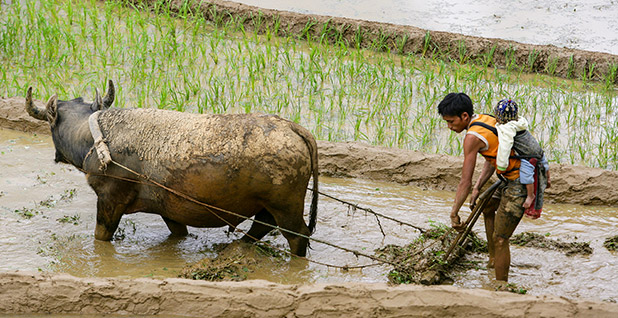 |
| A new study finds that higher carbon dioxide concentrations reduce the nutritional quality of rice. Pictured: a rice farmer plowing a field in Vietnam. Nguyen Anh Tuan/Flickr |
Chelsea Harvey, E&E News reporter
One of the world’s most important food crops may be declining in quality due to greenhouse gas emissions.
One of the world’s most important food crops may be declining in quality due to greenhouse gas emissions.
The results of a major study, published yesterday in Science Advances, suggest that rice — a crucial food source for billions of people — is less nutritious when grown under higher carbon dioxide concentrations. Its stores of protein, iron, zinc and some important B vitamins all decline.
That’s a potential concern for public health, the authors say, particularly in poorer nations where rice makes up a large proportion of people’s diet.
“These results indicate that the role of rising CO2 on reducing rice quality may represent a fundamental, but underappreciated, human health effect associated with anthropogenic climate change,” the authors, led by Chunwu Zhu of the Chinese Academy of Sciences, wrote in the paper.
The findings challenge a common argument floated among doubters of accepted climate science — that rising CO2 concentrations are a net positive for global vegetation, including crops.
Rep. Lamar Smith, a Texas Republican who leads the House Science, Space and Technology Committee, is one outspoken proponent of the idea. In an essay published last summer in The Daily Signal, he argued that more carbon dioxide will lead to increased plant growth, spurring “a greater volume of food production and better quality food.”
But the new research — and other studies published before it — discredit those claims.
“We have some rice varieties that show a stronger response to CO2 and they are able to convert more of that CO2 into seed, which can be good,” said senior study author Lewis Ziska, a scientist with the Department of Agriculture. “On the other side of that coin is the quality of that seed also being diminished in response to CO2.”
The new study evaluated 18 types of commonly grown rice to see how they would respond to elevated levels of carbon dioxide. In the experiments, the researchers increased ambient carbon dioxide levels to concentrations between 568 and 590 parts per million. Currently, atmospheric carbon dioxide concentrations hover around 410 ppm — but at the rate they’re currently rising, they could reach the high levels used in the study by the end of the century, if action isn’t taken to curb them.
Compared with current concentrations, the rice crops’ nutrient contents all suffered under higher carbon dioxide levels. On average, protein levels declined by about 10 percent, iron by 8 percent and zinc by 5 percent. The researchers also found that certain B vitamins declined significantly, some by up to 30 percent. Vitamin E was the only nutrient found to increase under higher CO2.
The research “corroborates previous work that we’ve done, showing that elevated CO2 alters the protein, iron and zinc content of rice — and, in the case of our work, in other staple food crops, as well,” said Samuel Myers, a Harvard University expert on climate change and human health.
Myers, who was not involved in yesterday’s research, has co-authored previous studies that came to similar conclusions — elevated carbon dioxide concentrations cause nutrients to decline in globally important crops, including rice, wheat, barley and soy. While his work has mainly focused on protein, zinc and iron, the new study is among the first of its kind to evaluate the impact of carbon dioxide on vitamins — and it seems that for some of them, the outcomes may be similar.
Altogether, the growing body of research on crops and carbon dioxide levels indicates the future isn’t nearly as rosy as Smith and others might suggest. While more carbon dioxide can increase growth and production in some plants — all other conditions held equal — it seems that there are trade-offs after all. Bigger crops aren’t necessarily useful to human societies if they’re less nutritious.
Additionally, some recent research suggests that the growth spurred by higher carbon dioxide levels could plateau after a certain point, Myers noted. And there are myriad other climate-related factors, such as rising temperatures and changes in precipitation patterns — all spurred by greenhouse gas emissions — that may harm agriculture, as well.
The idea that rising carbon dioxide levels are nothing but a positive for global crops is “pure nonsense,” Myers said.
The declines in nutrition raise an obvious concern for public health, especially when observed in global staple crops like rice. Scientists are still evaluating exactly how much of a problem these nutrient declines might turn out to be.
In previous studies, Myers and his colleagues have used models to simulate the diets of people around the world, the nutrients they receive from those foods and the declines in nutritiousness if CO2 levels rise. Some populations could experience nutrient deficiencies in the future, some studies found. One high-profile 2015 study in The Lancet suggested that 140 million more people worldwide may suffer from zinc deficiency by 2050.
The new study took a more economic approach. Focusing on the top 10 highest rice-consuming nations in the world, it compared rice consumption — and the nutrient losses under higher CO2 — with each country’s gross domestic product per capita. They found that people in countries with lower GDP per capita, where rice may make up a greater proportion of their daily diet, are likely to be hit hardest.
Still, “what the nature of that impact is in terms of nutritional effects and health effects” remains to be seen, Ziska noted.
Myers cautioned that a more detailed modeling study — which examines exactly how much of each nutrient a person derives from rice, as opposed to other food sources — would be needed to fully evaluate the public health concerns raised by the new research.
In the meantime, Ziska hopes to investigate how crop nutrient contents may have already changed in previous decades, in response to historical greenhouse gases emissions. He says it may yield further insights into how crops react to future carbon emissions.
“Trying to understand those complexities and trying to understand those interactions is one of the things we think is very important,” he said.
personal chefs and event catering
Miami + Miami Beach + Fort Lauderdale + Palm Beach


0 Comments